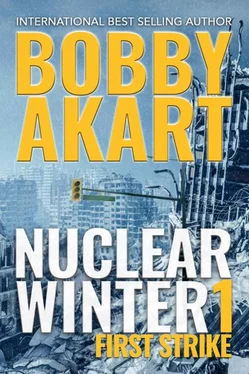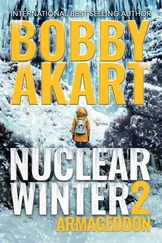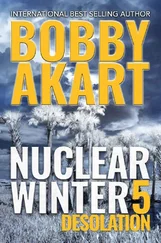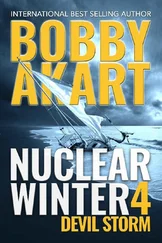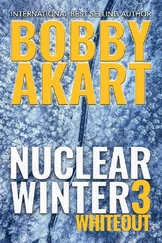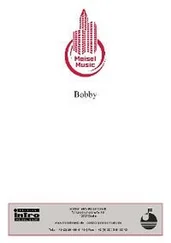She focused on all of the things the government harped on—water, batteries, candles, etcetera. Lacey spent the better part of the morning focusing on food that was easily transportable. She purchased all of the high-calorie MRE bars at Bass Pro Shops to supplement her own store’s inventory. MRE was an acronym for meals-ready-to-eat. Her store sold a wide variety of easily transportable, long-lasting food products designed for campers and hikers. As of noon that day, she was completely out of stock. Every case of anything edible was sitting in her living room.
She doubled the quantity of her camping and hiking gear. The same was true of their clothing. If the time came, they’d be heading into the Sierra Nevadas as an early snowstorm arrived. If Peter’s warnings were correct, they might not be able to return home, a reality that hadn’t quite set in yet.
By nightfall, when the deluge of rain had invaded the coastal areas, Lacey and Tucker had filled the living room with gear, supplies, food, and water. Their focus on the basic necessities was a success. However, it was Tucker who was the first to point out a potential shortfall.
“Hey, Mom, why don’t we have a gun?”
Lacey, who was exhausted as she sat on the only seat on the sofa not covered with piles of clothing, responded, “Well, frankly, we never found the use for one. We’re not against guns like a lot of people around here. It’s just that we aren’t hunters, and because we live in a safe gated community, we’re not afraid of break-ins.”
Tucker just stood there for a moment, and then he, too, surveyed all of the items they’d amassed over the last twenty-four hours. He glanced back toward the hallway leading to the garage where the Expedition awaited.
“Mom, this is a lot of stuff. Is it all gonna fit?”
Lacey pushed herself off the couch and stood in the middle of the room, slowly rotating in a complete circle to take it all in. They’d need to go back to U-Haul to rent a box truck, she thought to herself half-jokingly.
Owen was listening to the ESPN hosts discuss the ongoing World Series when the inside of the car exploded in a cacophony of warning signs and computer-generated voices.
The ESPN programming was interrupted to issue an ominous alert. The screen on his SiriusXM radio changed to read:
EMERGENCY ALERT
BALLISTIC MISSILE THREAT INBOUND TO CALIFORNIA.
SEEK IMMEDIATE SHELTER. THIS IS NOT A DRILL.
Owen received a text message from the California State Warning Center, known as Cal OES, which issued a push alert to all cell phones and handheld tablet computers located within the state’s IP address locations.
Cal OES: The U.S. Pacific Command has detected a missile threat to California. A missile may impact on land or sea within minutes.
THIS IS NOT A DRILL.
If you are indoors, stay indoors. If you are outdoors, seek immediate shelter in a building. Remain indoors well away from windows. If you are driving, pull safely to the side of the road and seek shelter in a building or lie on the floor. We will announce when the threat has ended.
THIS IS NOT A DRILL. Take immediate action measures.
The disaster app began to wail. Outside the car, through the driving rain, California’s siren warning system, which had been tested just weeks before as part of a missile preparedness exercise, had been activated, emitting a high-pitched wail.
Owen, like many other motorists, froze for a moment, unsure what to do. Then, as if prompted by an invisible cattle prod, they reacted.
Some jumped out of their cars, leaving their doors open and engines running. They raced away toward the east, logically trying to get away from the coastline. Others calculated the shorter distance to land was back toward the west. Large groups of people collided with one another, resulting in a massive human scrum on the bridge.
Owen pushed his way in between the three lanes of stalled vehicles toward home. Behind him, horns were blaring and tires were screeching as motorists tried to force their back way off the bridge. Several panicked motorists tried to jump over the concrete barrier separating the east- and westbound lanes of the causeway. They were plowed down by speeding traffic as drivers raced to perceived safety somewhere in East Palo Alto.
It was mayhem, and San Franciscans weren’t handling the threat very well. As Owen ran, he tried to call Lacey and Tucker. Cell towers were overwhelmed with millions of others doing the same. His mind raced as he thought of the buildings and facilities on the east side of the Dumbarton Bridge. He’d passed by there twice a day, five days a week, for years, yet his mind drew a blank.
Was there a nuclear fallout shelter over there? Was there even a building with a basement considering its close proximity to the bay? How much time did he have before the bombs hit?
Owen wanted to throw up, but he kept moving. He focused on his love for Lacey and Tucker. He prayed they’d taken off to the east like they’d discussed. He wanted them to live, even if he couldn’t. He refused to let despair overtake him. So he pressed forward. He abandoned all sense of decorum or politeness. Like so many others were doing, he knocked anyone down who prevented him from reaching safety.
Lacey had been marshalling their assets. Picking and choosing what was a priority based upon the survival rule of threes. A person can only live three hours in extreme weather without adequate shelter. Without hydration, the human body begins to deteriorate rapidly without water after three days. Without food and adequate nutrition, the body begins to cannibalize itself after three weeks.
With that being her focus, she started giving things to Tucker to pack into the back of the Expedition. After the Bronco was affixed to the tow dolly and the hitch of the Expedition, they’d fill it with their most essential gear.
“Mom!” yelled Tucker from the garage. His disaster app had issued an incoming ballistic missile alert.
Lacey heard it as well, and the television screen was filled with the warning. She ran down the hallway toward him as he raced back inside. They nearly collided but spontaneously hugged one another instead. She gripped her son by the shoulders and looked up to the taller young man.
“No panicking. Okay.”
Tucker nodded. “What about Dad?”
“Let’s see where he is. Try calling him on both your cell and our landline in case you can’t get through. Let me check the app.”
The McDowells’ cell plan enabled them to link their locations together. At any given time, they could check on each other. Lacey thought that was an essential feature with a teenage boy in the house. She opened the map and searched for Owen. It showed him on the Dumbarton Bridge, moving slowly in the direction of the Nimitz Freeway.
“Anything?” she hollered at Tucker in the kitchen.
“Circuits are busy!” he yelled his response. “I’ll try to text!”
Lacey ran into the living room and located her laptop. In all her preparations, with the assumption they’d immediately be leaving town when the warnings were issued, she hadn’t bothered to locate the nearest fallout shelter.
She searched nuclear fallout shelters near me and viewed the results.
Besides Ready.gov, which was essentially worthless because the advice it gave was to hide under your bed, the other results were survivalist websites trying to sell products or backyard buried shelters.
She drilled down in her search, using fallout shelters near San Francisco . Her mouth fell open as she viewed the results. The words abandoned, thing of the past , and no plan were common. She shook her head in disgust as she ran her fingers through her hair.
Читать дальше
